| Prominent Eighteenth and Nineteenth Century Americans |
| |
| |
| Lot |
Photo |
Description |
Lot 152 |
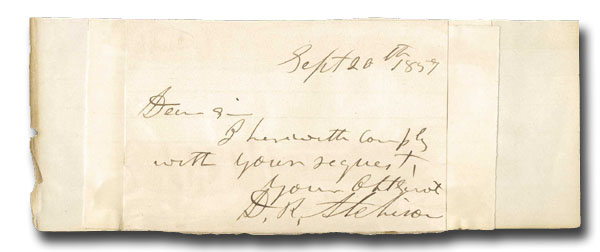 |
Atchison, David Rice (1807-1886), A United States senator from Missouri (1843-55). Autograph Note Signed, one page, 4 x 2½ no place, September 20, 1857. Apparently in response to an autograph request: "Dear Sir, I herewith comply with your request. Your Obt Servt, D. R. Atchison". Mounted with minor wrinkling, Very Fine.
Estimate 500 - 750
Atchison is known to trivia buffs as the man who was "president for one day." Supporters claim he was president on March 4, 1849, when newly-elected president Zachary Taylor refused to take the oath of office on a Sunday. The term of incumbent James Polk ended that day at noon, leaving the office theoretically vacant until Taylor was sworn in on Monday. As president pro tempore of the Senate, Atchison would have been next in line for the job. Atchison, however was never sworn in or assigned the presidency in any way, and Taylor took the oath on March 5th. Nevertheless, as years passed Atchison's "term" became a popular bit of historical lore, and his grave marker reads "David Rice Atchison — President of the United States for One Day."
View details and enlarged photo
|
Lot 153 |
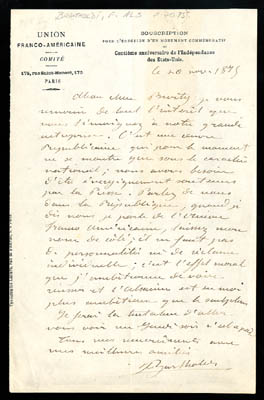 |
[Statue of Liberty] Bartholdi, Frédéric Auguste (1834-1904), French sculptor of Liberty Enlightening the World, the Statue of Liberty, that was donated in 1886 to the U.S. by the Union Franco-Americaine (Franco-American Union),.
Autograph Letter Signed, "F. Bartholdi", full page, 5¼ x 8¼ Paris, France, November 20, 1875. On Franco-American Union letterhead with imprint "Subscription for the Erection of a Commemorative Monument for the One Hundredth Anniversary of the Independence of the United States", Bartholdi writes to "My Dear Burty", apparently a member of the press. Bartholdi, referring to the Statue of Liberty as "our great project" says [in French],
"…we need to be energetically supported by the media. Speak of us in France; when I say "us" I refer to the Franco-American union, leave names aside; we are not dealing with personalities nor individual acclaim; it is the moral effect that I want to see succeed and the Alsacian in me is more ambitious than the sculptor…"
Excellent content with Bartholdi talking directly about the Statue of Liberty. Very Fine.
Estimate 750 - 1,000
View details and enlarged photo
|
Lot 154 |
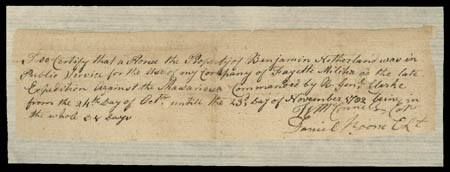 |
Boone, Daniel (1734-1820), American pioneer and hunter whose frontier exploits made him one of the of the United States' first folk heroes; established the Wilderness Road into Kentucky and founded Boonesborough, one of the first English-speaking settlements beyond the Appalachians. Document Signed one page, 7¾ x 2, no place, no date. Document reads:
"I do certify that a Horse the Property of Benjamin Netherland was in Public Service for the use of my Company of Fayette Militia as the late Expedition against the Shawanees commanded by B. Gen'l Clarke from the 24th Day of Octr. untill [sic] the 23d Day of November 1782 being in the whole 30 days"
Document boldly penned with strong signature by Boone. Signed by "Wm Connels Can" [Captain] and "Daniel Boone CLt [Lt. Colonel]. Mounted on backing paper; moderately toned vertical creases and straightline splits and a small hole being rendered nearly invisible, Fine appearance. Also includes an 8 x 10 engraving of an elderly Boone in fur-trimmed leather garb with his dog and his flint-lock rifle.
Estimate 12,000 - 15,000
When Kentucky was divided into three Virginia counties in November 1780, Boone was promoted to lieutenant colonel in the Fayette County militia. In April 1781, Boone was elected representative to the Virginia General Assembly in Richmond. In 1782, he was elected sheriff of Fayette County. In August of 1782 he fought in the Battle of Blue Licks, one of the last major campaigns of the Revolutionary War, a battle in which his son Israel was killed.
View details and enlarged photo
|
Lot 155 |
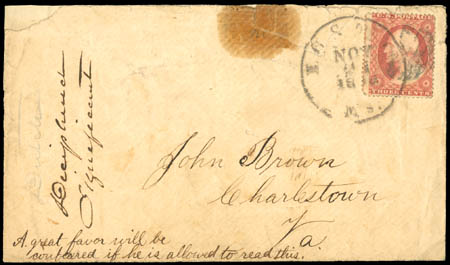 |

Brown, John, American abolitionist; advocated and practiced armed insurrection as a way to end slavery. cover postmarked Boston, Nov 21 1858, addressed to Brown in prison in Charlestown, Va., sender's endorsement, "A great favor will be confeared [sic] if he is allowed to read this" and censor's notation, "Deciphered, Insignificant", cover faulty, Fine.
Estimate 200 - 300
Three weeks prior to this letter, on November 2, Brown had been convicted of treason, multiple first-degree murders, and inciting an insurrection among Virginia slaves. He was hanged on December 2.
View details and enlarged photo
|
Lot 156 |
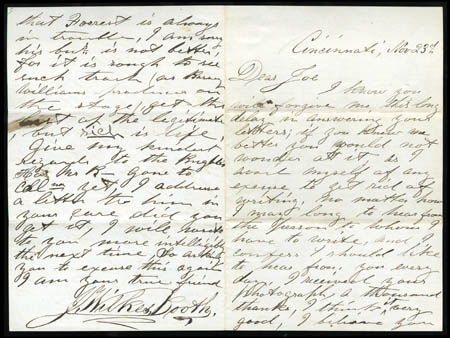 |
Booth, John Wilkes (1838-1865), American stage actor who assassinated Abraham Lincoln at Ford's Theatre in Washington, D.C. on April 14, 1865. Autograph Letter Signed "J. Wilkes, Booth", three pages, 5¼ x 7¾ Cincinnati, Ohio, November 23, 1861. To J. H. Simonds at Merchants Bank, Boston, in part:
"Dear Joe, I know you will forgive me, this long delay in answering your letters; if you know me better you would not wonder at it, as I avail myself of any excuse to get rid of writing, no matter how I may long to hear from the person to whom I have to write, and I confess I should like to hear from you every day. I received your photograph, a thousand thanks, I think it very good, I believe you have mine. My second week in Buffalo was so, I played 17 nights in Detroit to a good Res[ul]t -. Open here Monday night, 25th, they count high on me but I am doubtful as to my success. Maggie Mitchel is playing a good engagement here, I should have said has been; as she finished last night…It seems that Forrest is always in trouble, I am sorry his back is not better, for it is rough to see such trash (as Barney Williams practices on the stage) get the best of the legitimate but sich [sic] is life. Give my kindest regards to the Rugbles…I am your true friend, J. Wilkes, Booth"
Boldly penned with strong signature by Booth, minor ink blotting, else Very Fine. Includes mailing envelope in Booth's hand postmarked "Cincinnati Nov 24".
Estimate 30,000 - 40,000
Simonds held a cashier position at the bank at the time he and Booth presumably first met in Boston when Booth was visiting his brother Edwin. Later the two developed a business relationship, with Simonds managing Booth's oil investments. Apparently Simonds had no idea about Booth's plot against Lincoln; in fact, in early 1865 he even castigated Booth for not paying more attention to his acting and business affairs. Forrest refers to Edwin Forrest, an accomplished American actor who was one of the principal belligerents in the Astor Place Riot of 1849. Forrest made a comeback to the stage in 1860.
Of philatelic interest is the fact that the stamp used to frank the mailing envelope is the very scarce 3¢ pink of 1861 (Scott 64).
View details and enlarged photo
|
Lot 157 |
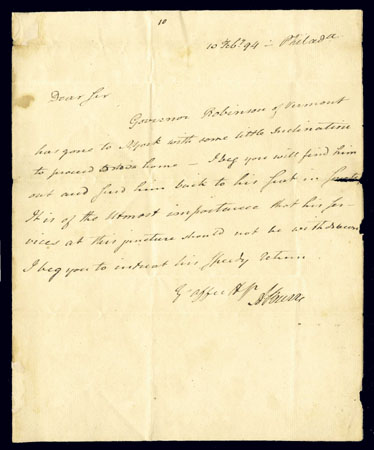 |
Burr, Jr., Aaron (1756-1836), American politician and Revolutionary War hero; Vice President of the United States under Thomas Jefferson (1801-1805); during his term as Vice President, killed Alexander Hamilton in a duel. Autograph Letter Signed as U.S. Senator from New York, "A. Burr", one page, 7¼ x 9, Philadelphia, February 10, 1794. To Melancthon Smith, New York, in full:
"Dear Sir, Governor Robinson of Vermont has gone to N. York with some little inclination to proceed home — I beg you will find him out and send him back to his Seat in Senate. It is of the utmost importance that his services at this juncture should not be withdrawn. I beg you to intreat him speedy return."
Integral address leaf in Burr's hand with Free Frank signature "Free A. Burr" and straightline "Free" and "10 Fe" postmarks. Moderate foxing along the file fold on the address leaf; 1½" tear on the same leaf, split at end of same fold on both leaves affecting the word "Senate", otherwise Fine.
Estimate 2,000 - 3,000
The Governor Robinson mentioned in Burr's letter is Moses Robinson (1741-1813), governor of the Vermont Republic before it became a state. Robinson also served one term in the U.S. Senate from 1791 to 1797. He and Burr were two of the fourteen anti-Administration members of the thirty member Senate at the time. Without Robinson's presence, the anti-Administration wing would have been decisively outnumbered in any debate or vote.
View details and enlarged photo
|
Lot 158 |
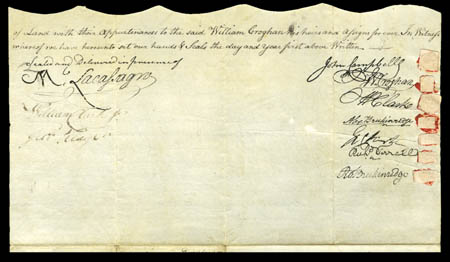 |
Clark, George Rogers (1752-1818) and William (1770-1838), George was a commanding officer who won several convincing battles on the northwestern frontier during the Revolutionary War; William was a soldier and explorer who, along with Meriwether Lewis, headed the famous Lewis and Clark Expedition to the Pacific. Document Signed, "G. Clark" and "W. Clark", two pages, 11¼ x 12¼ on vellum, "Indiana Territory", August 31, 1789. Indenture relating to a grant of 200 acres of land to William Croghan from a 149,000 acre parcel allocated to Illinois Regiment military veterans. Additionally signed by five others with intact paper/wax seals beside the signatures of all seven men. A few natural folds with light soiling, Fine.
Estimate 3,500 - 5,000
A RARE DOCUMENT ASSOCIATING THE CLARK BROTHERS.
Leader of the Kentucky militia throughout much of the war, George Rogers Clark is best-known for his celebrated capture of Kaskaskia (1778) and Vincennes (1779), which greatly weakened British influence in the Northwest Territory. Because the British ceded the entire Northwest Territory to the United States in the 1783 Treaty of Paris, Clark was often referred to as the "Conqueror of the Old Northwest." Younger brother William was only 19 years old at the time of this document.
View details and enlarged photo
|
Lot 159 |
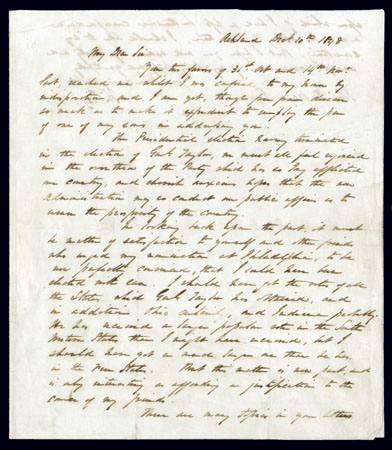 |
Clay, Henry (1777-1852), American statesman and orator, represented Kentucky in both the House of Representatives and Senate; perennial Presidential candidate. Autograph Letter Signed two pages, 9 x 10½ December 10, 1848. To John D. Hayes regarding the recent Presidential election results, in part:
"The Presidential election having terminated in the election of Genl. Taylor, we must all feel rejoiced in the overthrow of the Party which has so long afflicted our Country, and cherish anxious hopes that the new Administration may so conduct our public affairs as to assure the prosperity of the country. In looking back upon the past, it must be matter of satisfaction to yourself and other friends who urged my nomination at Philadelphia, to be now perfectly convinced, that I could have been elected with ease. I should have got the votes of all the States which Genl. Taylor has obtained, and in addition, Ohio certainly, and Indiana probably. He has received a larger popular vote in the South Western States that I might have received, but I should have got a much larger one than he has in the New States. But this matter is now past, and is only interesting as affording a justification to the course of my friends."
Letter is inserted into cloth-bound volume with gold embossed lettering, and includes several typed pages of background information on Clay. The letter itself is boldly penned with strong signature; page repair evident across center horizontal fold of both pages, otherwise Fine.
Estimate 4,000 - 5,000
FINE POLITICAL CONTENT FROM A PERENNIAL PRESIDENTIAL CANDIDATE AFTER THIS, HIS THIRD AND FINAL DEFEAT.
Provenance: Dr. Max Thorek
An interesting letter concerning Clay's political ambitions. Clay feels that he would have won the election over Zachary Taylor had the votes of the new states been counted.
View details and enlarged photo
|
Lot 160 |
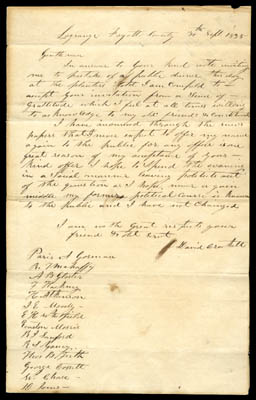 |
Crockett, Colonel David Stern, "Davy" (1786-1836), celebrated American folk hero, frontiersman, soldier and politician; represented Tennessee in the U.S. House of Representatives, served in the Texas Revolution; killed at the Battle of the Alamo. Autograph Letter Signed, "David Crockett", one page, 7¾ x 12¼ Lagrange, Tenn., September 30, 1835. To a group of 14 named gentlemen in reply to an invitation given to Col. Crockett to a social dinner when on his way through the area, in part:
"In answer to your kind note inviting me to partake of a public dinner this day at the Planters Hotel I am compeld [sic] to accept your invitation from a sense of gratitude…I have announced [sic] through the news papers that I never expect to offer my name again to the public for any office is one great reason of my acceptance of your kind offer. I hope to spend the evening in a social manner leaving politics out of the question…"
Very minor edge toning and small, insignificant nick at top, Fine and Rare.
Estimate 40,000 - 50,000
A NICE SPECIMEN OF CROCKETT'S LATER CORRESPONDENCE WITH INTERESTING POLITICAL CONTENT.
Crockett was an outspoken critic of President Andrew Jackson's policies, so much so that Whig party leaders attempted to use Crockett in their anti-Jackson campaigns. It was during this period that several purported biographies and autobiographies of Crockett appeared, their purpose being to increase his public profile, thereby giving more weight to his anti-Jackson sentiments nationally. These literary efforts largely failed and Crockett was defeated in 1835, ending his congressional career.
This letter was written a month before Crockett left Tennessee to explore Texas, where he would sign an oath as a protector of the Texas Provisional Government. In March of 1836 he was killed at the Alamo defending Texas independence.
View details and enlarged photo
|
Lot 161 |
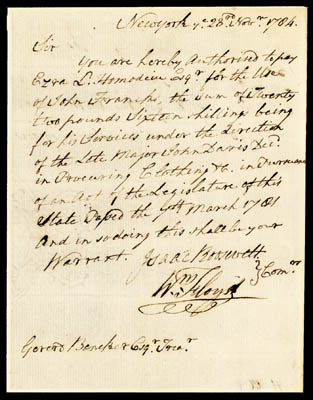 |
Floyd, William (1734-1821), New York signer of the Declaration of Independence, soldier, U.S. Congressman. Document Signed, "Wm. Floyd", one page, 5¼ x 6¾ New York, November 23, 1784. Warrant to New York State Treasurer, Gererd Bancker:
"You are hereby authorised to pay Ezra L'Homodieu for the use of John Francks, the sum of twenty two pounds sixteen shillings being for his services under the direction of the Late Major John Davis Decd. in Procuring Clothing &c. in pursuance of an Act of the Legislature of this State passed the 7th March 1781 and in so doing this shall be your warrant."
Written and co-signed by Isaac Roosevelt (1726-1794); half-page receipt for the aforementioned sum penned and signed on verso by Ezra L'Hommedieu. Inlaid to an overall 8 x 10, Very Fine.
Estimate 3,000 - 4,000
THIS DOCUMENT, IN ADDITION TO FEATURING A BOLD SIGNATURE OF A SIGNER OF THE DECLARATION OF INDEPENDENCE, IS A RARE HOLOGRAPH DOCUMENT OF THE MOST SUCCESSFUL ROOSEVELT FAMILY MEMBER PRIOR TO THEODORE.
Isaac Roosevelt was one of ten representatives from New York City who participated in the state Constitutional Convention (also among the ten were John Jay, Alexander Hamilton and Robert Livingston). He was the great-great-grandfather of Franklin Delano Roosevelt.
Ezra L'Hommedieu was a New York State delegate to the Continental Congress from 1779 to 1783 and again in 1788.
View details and enlarged photo
|
Lot 162 |
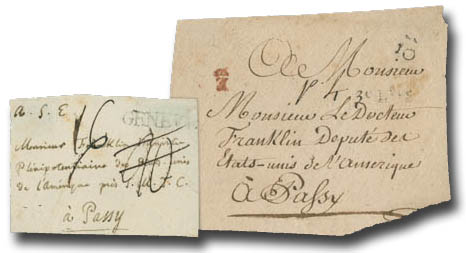 |

[Benjamin Franklin], group of eight cover fronts addressed to Franklin in Paris (Passy) while Minister to France, all but one in French (the other in English), six with French postal markings (one manuscript rate only), one Swiss and one apparently hand-carried, various spellings including "Francklin" and "Franklyn", generally Fine.
Estimate 500 - 750
View details and enlarged photo
|
Lot 163 |
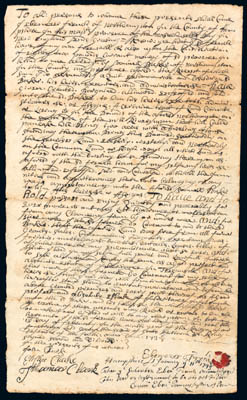 |
French, Ebenezer, Early New England settler in Northampton, Mass. Document Signed one page on parchment, 7¼ x 12¼ Northampton, Hampshire County, January 11, 1743. Land deed granting property to Mr. French. Countersigned by Gosen Rourke, Elisha Clarke, and Thamar Clark, members of the town committee tasked to make land divisions. Last line of deed mentions Ebenezer Pomeroy.
Boldly penned and signed by committee members with remnants of red wax seal to right of French's signature. Light toning and small page faults, else Fine.
Estimate 500 - 750
Northampton established a committee to divide up the lands to its inhabitants, many of whom had complained that their lots were too small. The new settlement of Southampton (originally part of Northampton) was first recorded in 1732 and had John Stoddard, Ebenezer Pomeroy, Deacon John Clark, Hon. Joseph Hawley and Ensign Ebenezer Parsons as members. The first precinct meeting was held in September 1741 where Ebenezer Kingsley, Phineas King, Waitstill Strong, Ebenezer French, Aaron Clark and Stephen Sheldon were chosen.
View details and enlarged photo
|
Lot 164 |
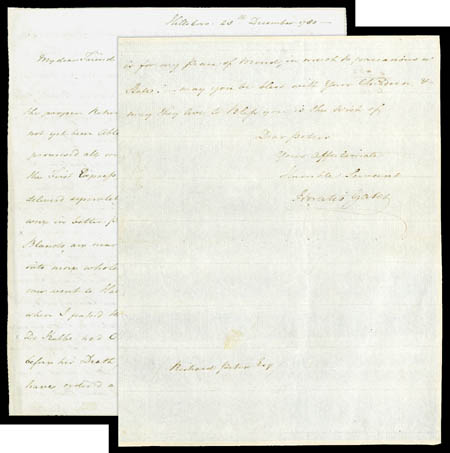 |
Gates, Horatio Lloyd (1727-1806), British soldier turned American general during the Revolutionary War. Autograph Letter Signed, 2½ pages, 7 x 8¾ Hillsboro, December 28, 1780. To Richard Peters, secretary to the Board of War, three weeks after Nathanael Greene had replaced Gates as commander of the Southern Department, as a result of Gates' disastrous defeat at the hands of General Cornwallis in the Battle of Camden [S.C.]. The letter reads in part:
"…I wish I could say the Cavalry were in better plight. The Regiments of Baylor, and late Blands, are near one half sick. I have shifted them into more wholesome Quarters…Though the returns are intended for the Board, this is designed only as a private Letter, my official one will come with the General Returns - for your private information…" Then, apparently not believing that the loss of his command was permanent, he writes, ".should the French Troops turn this way, & I am continued in Command, I must desire Clajon may be dispatched to Hillsborough, as will be utterly impossible for me to act with them, without his assistance…"
Two pages rejoined with second page inlaid into a thin paper frame, Fine.
Estimate 3,000 - 4,000
This letter was written on the same day that Virginia's House of Delegates unanimously passed a resolution requiring a board of inquiry into Gates' conduct at the Battle of Camden.
View details and enlarged photo
|
Lot 165 |
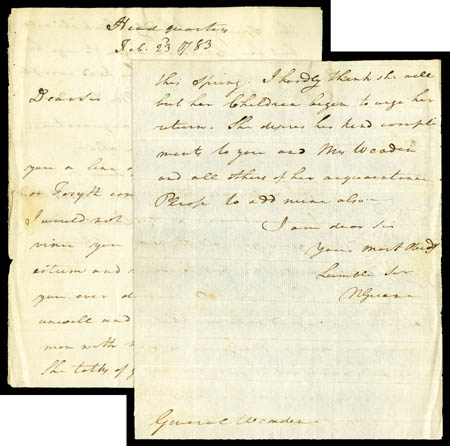 |
Greene, Nathanael (1742-1786), A major general of the Continental Army in the American Revolutionary War who rose from the lowest rank to become one of George Washington's most trusted military staff members. Autograph Letter Signed, as general, two pages, 7¼ x 9, "N. Greene", Head Quarters, February 23, 1783. To "General Weaden [Weedon], Virginia", in full:
"Dear Sir, I will only write you a line of remembrance as May or Forsyth can give you all the news. I would not write this but to convince you that you hold the same esteem and regard with me that you ever did. Mrs. Greene is very unwell and what is very uncommon with her is rather low spirited. She talks of going to the Northward this spring. I hardly think she will but her Children begin to urge her return. She desires her kind compliments to you and Mrs. Weaden [sic] and all others of her acquaintance. Please to add mine also. I am dear Sir Your most obedt humble svt, N Green"
With integral address leaf in another hand bearing a Free Frank signature, "N Greene", in the same hand; docketed "From Genl Green 1783" on verso [interesting that each man misspelled the other's name]. Generally Very Good condition with moderate toning and foxing normal for a document of this age.
Estimate 3,000 - 4,000
A WONDERFUL PIECE OF REVOLUTIONARY WAR CORRESPONDENCE BETWEEN TWO HIGH RANKING OFFICERS OF THE CONTINENTAL ARMY.
This letter comes from the personal papers of George Weedon (1730-1790), an American Brigadier General in the Revolutionary War. Weedon resigned his commission in 1778 after a seniority dispute. After returning home to Virginia, he took command of a state militia brigade at Thomas Jefferson's request. His brigade inflicted a key military defeat on the British at the Battle of Yorktown.
View details and enlarged photo
|
Lot 166 |
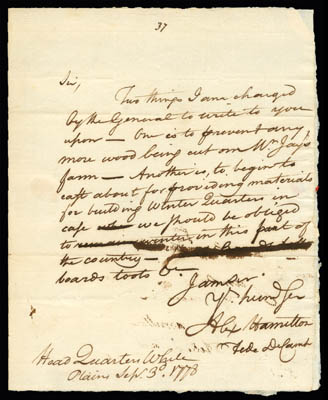 |
Hamilton, Alexander (1755-1804), West Indies-born soldier, lawyer and politician, Secretary and aide-de-camp to George Washington, 1st Secretary of the Treasury (1789-1795), co-wrote The Federalist Papers with James Madison and John Jay; killed in a duel by Aaron Burr War Date Autograph Letter Signed as Washington's aide-de-camp, one page, 6¾ x 8¼ Head Quarters, White Plains, September 3, 1778. To Charles Pettit, Assistant Quartermaster General, in full:
"Sir, Two things I am charged by the General to write to you upon — one is to prevent any more wood being cut on Wm. Jay's farm — Another is, to begin to cast about for providing materials for building Winter Quarters in case we should be obliged to winter in this part of the country - boards tools &c. I am sir Yr. huml Ser, [signed] Alex Hamilton, Aide De Camp"
Boldly penned with strong, large signature; moderate ink blotting in lower portion of text where Hamilton has struck out words; some light soiling on integral address leaf in Hamilton's hand to "Mr. Pettit, Ass. QMG" and minor wax seal damage on same leaf, otherwise Fine.
Estimate 7,500 - 10,000
Hamilton joined the Continental Army as George Washington's aide in March 1777 with the rank of Lieutenant Colonel and served for four years as Washington's de facto Chief of Staff. He handled both military and political correspondence, drafting many of Washington's orders and letters at Washington's direction, and was eventually allowed to issue orders for Washington over his own signature.
View details and enlarged photo
|
Lot 167 |
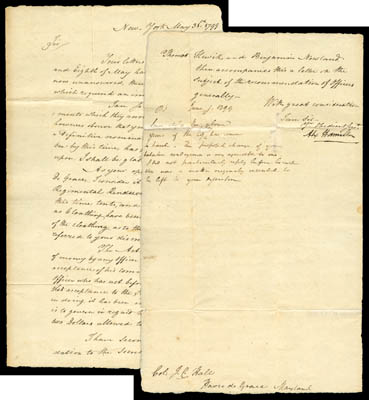 |
Hamilton, Alexander, Autograph Letter Signed, 1½ pages [two sides off same sheet], New York, May 31, 1799. To Col: J.C. Hall, Havre de Grace, Maryland, mentions the appointment of a Quarter Master, the selection of a Regimental Rendezvous point and,
"…I trust that by this time tents, and Camp Utensils as well as cloathing [sic] have been received. The disposition of the cloathing as to the place of deposit is referred to your discretion
"The Act of receiving an advance of money by any officer will determine his acceptance of his commission — But every officer who has not before done it ought to signify that acceptance to the Secretary of War. Delay in doing it has been inconsiderate. The law is to govern in regard to the compensation of two Dollars allowed to the recruiting officers.
"I have seconded your recommendations to the Secretary of War of Thomas Hewitt and Benjamin Nowland. There accompanies this a letter on the subject of recommendations of officers generally [not present] —
"With great consideration I am Sir Y.r Obedient Serv.t [signed] Alex Hamilton"
Hamilton then adds a post script in his own hand, dated June 1, in part, "…The proposed change of your batalion [sic] rendezvous is very agreeable to me. I did not particularly reply before because this was a matter originaly [sic] intended to be left to your discretion"
Internal splitting of some folds, otherwise Fine.
Estimate 7,500 - 10,000
EXCELLENT CONTENT FOR A HAMILTON LETTER REGARDING THIS LITTLE-KNOWN "WAR".
This letter was written while Hamilton served in the capacity of organizer and de facto commander of a national army during the "Quasi-War" with France (1798-1800) which took place entirely at sea. The army was intended to conquer the North American colonies of France’s ally, Spain, if war were to be formally declared, which it was not (the conflict is also referred to as "The Undeclared War with France").
View details and enlarged photo
|
Lot 168 |
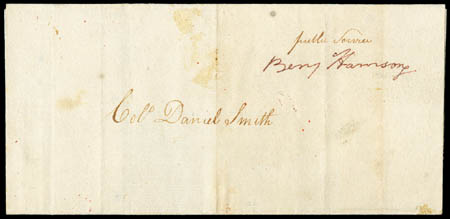 |

Benjamin Harrison (1726-1791), Signer of the Declaration of Independence, Governor of Virginia 1782-1784, Virginia Delegate to the Constitutional Convention in 1788, father of President William Henry Harrison, great-grandfather of President Benjamin Harrison [1833-1901].
Free Frank signature as Governor of Virginia, "Benj Harrison", on folded cover addressed to simply Col. Daniel Smith and endorsed "public service", docketed on flap "Gov. Ben. Harrison, Jan. 1782, appointment as a Western Commissioner"; file folds, Fine.
Estimate 300 - 400
Provenance: Stern
View details and enlarged photo
|
Lot 169 |
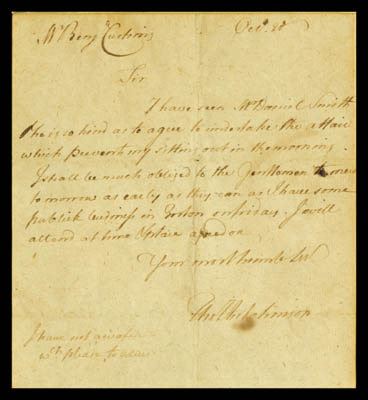 |
Hutchinson, Thomas (1711-1780), Colonial Governor of Massachusetts (1771-1774) at the time of the Boston Massacre. Autograph Letter Signed, one page, 6 x 7 (visible), no place, December 20, no year. To W. Benjamin Cushing regarding a possible meeting. Elegantly displayed in 15½ x 13 frame with inset portrait of Hutchinson and short biographical summary. Small tone spot at bottom edge of signature and one minor instance of ink blotting within text, otherwise Very Fine.
Estimate 500 - 750
W. Benjamin Cushing (1739-1792) was a soldier in the Revolutionary War and father of Thomas Cushing, a prominent Free Mason.
View details and enlarged photo
|
Lot 170 |
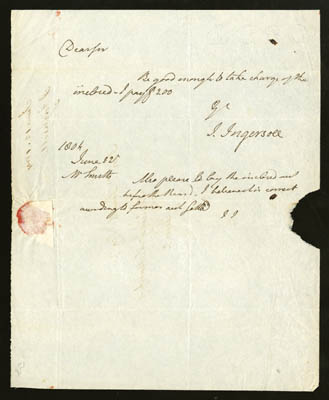 |
Ingersoll, Jared (1749-1822), Revolutionary War patriot; Philadelphia attorney and member of Continental Congress; delegate to Federal Convention of 1787; signer of the U.S. Constitution. Autograph Document Signed twice, one page, 7¾ x 9¾ [Philadelphia] June 22, 1804. To Jonathan Smith, Esq., Cashier of the Bank of Penna. "Be good enough to take charge of the inclosed. I pay $200. Yrs, J. Ingersoll" In a postscript Ingersoll adds, "Also please to lay the inclosed acct before the Board. I believe it is correct according to former acct settled. J. I." Addressed by Ingersoll on verso; seal tear in blank margin does not affect text, Fine.
Estimate 300 - 400
Ingersoll was one of the attorneys for chief bank cashier Smith in a suit filed against him and other bank officers in 1805. The case was eventually settled out of court.
View details and enlarged photo
|
Lot 171 |
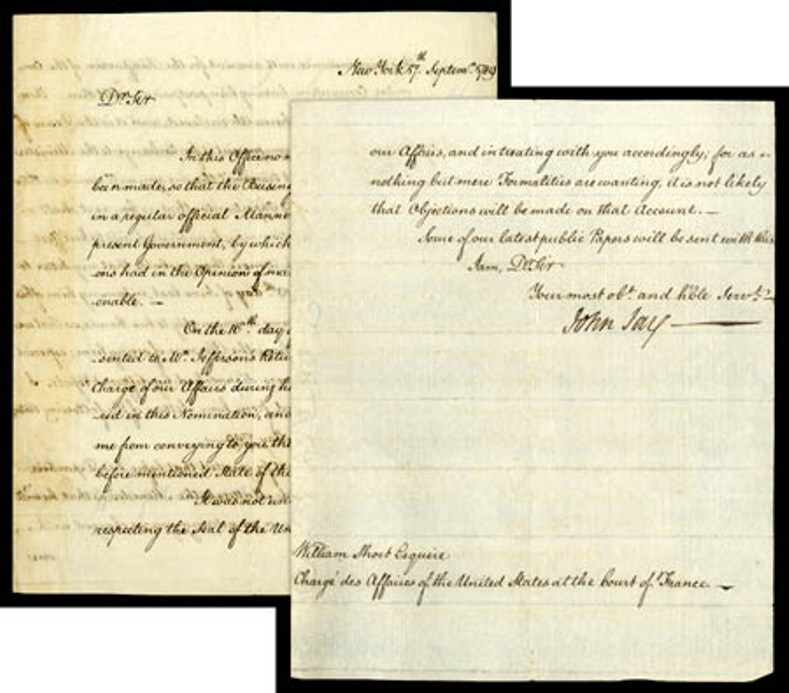 |
Jay, John (1745-1829), Jurist, politician, diplomat, President of Continental Congress (1777-1778), first Chief Justice of the U.S. Supreme Court (1789-1795), Governor of New York (1795-1801). Letter Signed, 2½ pages, 7¼ x 8¾ New York, September 17, 1789, to William Short, Esquire, Chargé des Affaires of the United States at the Court of France in Paris. Written shortly after the beginning of the French Revolution, the letter appoints Short to replace Thomas Jefferson as Minister to France so that Jefferson can return to the United States to become George Washington's Secretary of State. Letter reads in part:
"On the 16th day of June last the President consented to Mr. Jefferson's Return, and nominated You to take charge of our Affairs during his Absence - the Senate concurred in this Nomination, and nothing has since restrained me from conveying to you the necessary Documents, but the before mentioned State of this Department.
"It was not until very lately that all Doubts respecting the Seal of the United States were removed, and this circumstance will account for the Ratification of the Consular Convention having been postponed until then. You will now receive it herewith enclosed, and it is the Desire of the President that you present it for Exchange to the Minister without Delay, and transmit the one you will receive on their Part by the first good opportunity that as soon as it shall arrive, the Convention may be published and take effect…"
Neatly penned with a bold signature. Fine.
Estimate 3,000 - 4,000
The U.S. Constitution was adopted by the Constitutional Convention in Philadelphia on the same day this letter was written. It replaced the Articles of Confederation as the governing document of the United States.
View details and enlarged photo
|
Lot 172 |
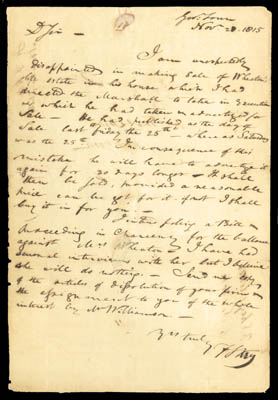 |
Key, Francis Scott (1779-1843), American lawyer, author, and amateur poet from Georgetown, who wrote the words to the "The Star-Spangled Banner". Autograph Letter Signed, "F S Key", one page, 7¾ x 11½ Georgetown, November 28, 1815. To Mr. Thomas Sexton, New York regarding the sale of an estate, in part,
"D Sir - I am unexpectedly disappointed in making sale of Wheaton's life estate in his house which I had directed the Marshall to take in Execution of which he had taken & notarized for Sale - He had published as the day of Sale last 'Friday the 25th' - whereas Saturday was the 25th. In consequence of this mistake he will have to advertize it again for 30 days longer - It shall then be sold, provided a reasonable price can be got for it - if not I shall buy it in for you…."
With integral address leaf in Key's hand and light illegible postmark. Overall two letters of text and minor ink blotches, especially over part in the second number in the date, else Fine.
Estimate 1,500 - 2,000
View details and enlarged photo
|
Lot 173 |
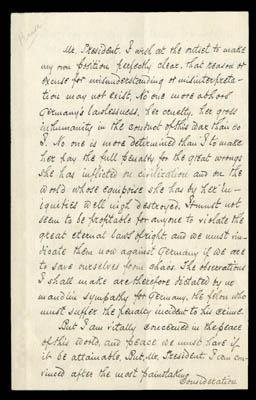 |
Knox, Philander Chase (1853-1921), American lawyer and politician who served as Attorney General under McKinley and T. Roosevelt (1901-04), U.S. Senator, Secretary of State under Taft (1909-13). Manuscript Signed "Philander Knox", three pages, each a separate leaf, 5½ x 8¾ the text of a speech denouncing the Treaty of Versailles, given before the Senate and President Woodrow Wilson, August 29, 1919, in part:
"Mr. President, I wish at the outset to make my own position perfectly clear … No one more abhors Germany's lawlessness, her cruelty, her gross inhumanity in the conduct of this war than do I … I am vitally concerned in the peace of this world, and peace we must have if it be attainable. But … I am convinced after the most painstaking consideration…that this treaty does not spell peace but war - war more woeful and devastating than the one we have but now closed. The instrument before us is not the treaty but the truce of Versailles … For one of the great defects thus far incident to the treaty is that too few minds have functioned on its provisions, and perusing it one finds it impossible to believe that any responsible mind had sought to coordinate its provisions and trace out their ultimate logical conclusions. Nothing in all our history … has called for a clearer perception of present and future, a keener or juster understanding of our free institutions, a clearer vision of the mighty mission of our great Nation in the world, or the dedication of a purer and loftier patriotism than the consideration of this treaty. Unless … we shall have the guidance of the infinite wisdom we shall fail in our duty, and, wrecking our beloved country, earn the odium of its treasonable betrayal."
The three pages tipped together at the left edge, Very Fine.
Estimate 400 - 500
IN HIS SPEECH KNOX ELOQUENTLY PRESAGES THE FAILURE OF THE TREATY OF VERSAILLES, AND CORRECTLY PREDICTS THAT ITS CONDITIONS WOULD ULTIMATELY LEAD TO ANOTHER GREAT WAR.
The Treaty of Versailles, which ended the state of war between Germany and the Allied Powers, was signed on June 28, 1919. One of its most important and controversial provisions required Germany and its allies to accept full responsibility for causing the war and to disarm, make substantial territorial concessions and pay reparations to certain countries that had formed the Entente powers. But Germany was neither pacified nor conciliated and began underming the treaty as early as 1922 and by the mid 1930s was completely ignoring it. The Nazi Party, in its rise to power, played upon the German people's sense of betrayal and dishonor caused by the signing of the Treaty, and eventually as an excuse to violate the treaty's terms.
View details and enlarged photo
|
Lot 174 |
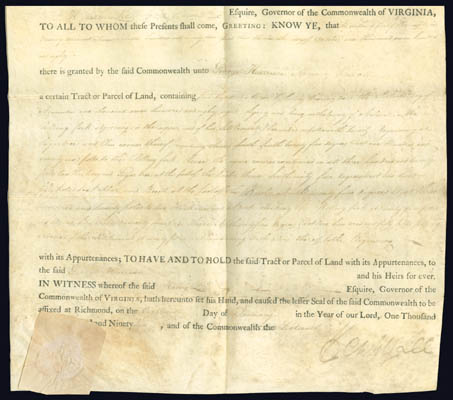 |
Lee, Henry ["Light Horse Harry"] (1756-1818), Officer in the Continental Army and politician, delegate to Continental Congress from Virginia (1786-1788), Governor of Virginia (1791-1794), U.S. Representative from Virginia (1799-1801). Eulogized George Washington as "First in war, first in peace, and first in the hearts of his countrymen." Document Signed as governor of Virginia, one page, 13½ x 12, Richmond, January 18, 1792. Land Grant on vellum, to one George Harrison "Assignee of John Moore" (Harrison’s name has been contemoraneously penned in where Moore’s had been erased). Folded in eighths and in Fine condition with bold Lee signature, though the ink is just a bit faded.
Estimate 200 - 300
View details and enlarged photo
|
Lot 175 |
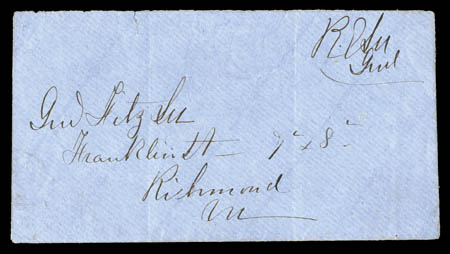 |

Lee, Robert Edward, U.S. Army officer and engineer, son of Revolutionary War hero, Henry "Light Horse Harry" Lee III; declined Lincoln's offer to lead the Army of the Potomac because his home state of Virginia was seceding; began Civil War as military advisor to Jefferson Davis, ended up as the South's most successful general, commander-in-chief of all Confederate forces; accepted the Union's terms of surrender on behalf of the Confederate States.
Free-franked cover, "R.E. Lee, Genl", addressed in his hand to his nephew, "Genl Fitz Lee, Franklin St - 7th & 8th, Richmond, Virginia"; small, insignificant tear at top, flap missing; Fine and very scarce.
Estimate 5,000 - 7,500
Expertization: 2004 P.F. Certificate.
Fitzhugh Lee (1835-1905) graduated from West Point in 1856 and served in the U.S. cavalry until the Civil War broke out; joined the Confederate States Army as a Lieutenant, rising to the rank of Brigadier General in 1862, at the age of 27; served with distinction at Antietam, Chancellorsville and Gettysburg; after the war was Governor of Virginia and a U.S Army general in the Spanish-American War.
View details and enlarged photo
|
Lot 176 |
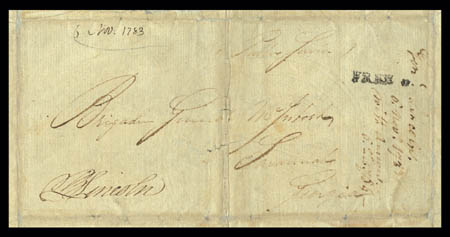 |
Lincoln, Benjamin (1733-1810), U.S. Revolutionary War General, First Secretary of War (1781-1783) under the Articles of Confederation. Free franked address leaf, November 6, 1783, "B Lincoln" and, in another hand, "Public Service", addressed in that same hand to General Lochlan McIntosh in Savannah, Ga., manuscript "6 - Nov: 1783" with handstamped "Free", docketed at right; silked on verso and inlaid to an overall 13¼ x 11¼ with some repaired internal breaks, none of which affect the bold signature, Fine appearance.
Estimate 500 - 750
McIntosh, the man who killed Button Gwinnett in a duel, was a close friend and compatriot of Lincoln. The two were captured and taken prisoner by the British when Charleston fell in May of 1780. Later, after a prisoner exchange, Lincoln played a major role in Cornwallis‘ defeat at Yorktown. Humiliated by his defeat, Cornwallis refused to personally surrender his sword to Washington and instead sent his second in Command, General Charles O'Hara. Washington, in response, sent Lincoln to accept Cornwallis' sword. This letter was written a month after Lincoln had resigned his position as Secretary of War and shortly before he retired from active military service.
View details and enlarged photo
|
Lot 177 |
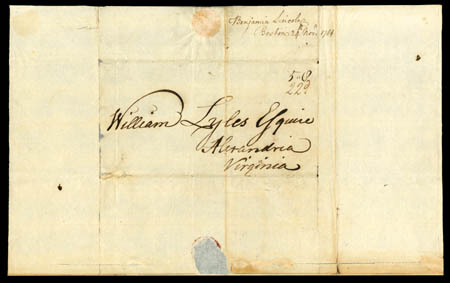 |
Lincoln, Benjamin, Autograph Letter Signed two pages, 8 x 12½ Boston, November 24, 1784. To William Lyles, Alexandria, Va., regarding various commercial ventures; integral address leaf in Lincoln's hand with manuscript "5S, 22d." rating; skillfully repaired along several splits and where wax seal has removed paper on address leaf, otherwise Fine.
Estimate 300 - 500
View details and enlarged photo
|
Lot 178 |
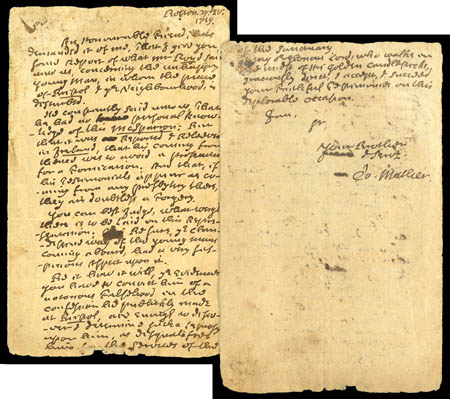 |
Mather, Cotton (1663-1728), Puritan minister from New England, author and pamphleteer; renowned for his involvement in the Salem Witch trials. Autograph Letter Signed "Co. Mather", 1½ pages, 4 x 6, Boston, April 24, 1719. To The Reverend Mr Samuel Danforth, Minister of Ye Gospel. Letter reads in pertinent part:
"An Honourable Friend, has demanded it of me, that I give you some report of what Mr. Boyd said unto us, concerning that unhappy young man, in whom that precise of Bristol & yr Neighbourhood, is disturbed.
He confessedly said unto us, that he had no personal knowledge of this McSparron: But that it was Reposted and Resolved in Zeeland, that his coming from the shed was to avoid a propension for a Fornication. And that, if his Testimonials appear as coming from any proselytary shore, they are doubtless a Forgery.
You can best judge, when weight there is to be laid on this representation; refuse, ye claudecant way of the young man's coming aboard, lend a very suspicious aspect upon it.
R[ea]d it how it will, ye evidence you have to convict him of a notorious falsehood in the confession he'd publickly made at Bristol, and enough to discover & determine such a leprosy upon him, as disqualifies him from the services of the sanctuary."
Strongly penned with some minor ink blotting. Detached address leaf in Mather's hand with remnants of wax seal at upper right. Average soiling and wear, Fine.
Estimate 7,500 - 10,000
A SCARCE AND FINE EXAMPLE OF WRITING BY AN INFLUENTIAL RELIGIOUS FIGURE ASSOCIATED WITH THE SALEM WITCH TRIALS.
View details and enlarged photo
|
Lot 179 |
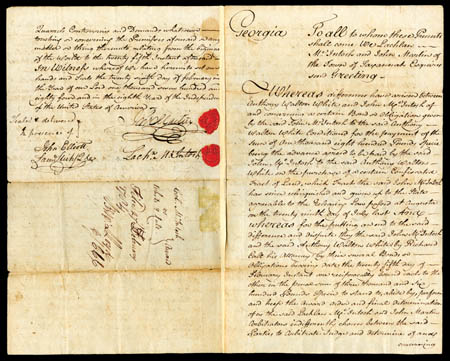 |
McIntosh, Lachlan (1725-1806), American military and political leader during the American Revolution who was elected to the Continental Congress in 1784, but never attended; killed Button Gwinnett, a political competitor and signer of the Declaration of Independence, in a duel. Document Signed, "Lachn. McIntosh", four pages, 7¼ x 11¾ Georgia, February 27, 1784. Court order in a financial dispute between Anthony Walton White and John McIntosh concerning a personal debt. Lot includes a separate page with a facsimile of signatures of the Declaration of Independence.
Boldly signed by McIntosh on behalf of named John McIntosh and by Jonathan Martin, presumably on behalf of White. Witnessed by John Elliott (1773-1827), U.S. Senator from Georgia,, and by a second signature. Two leaves, once rejoined, are again nearly separated, very minor tears at ends of horizontal folds, about Fine.
Also includes a mid-Nineteenth Century reproduction of the signatures on the original Declaration of Independence surrounded by an ornate multicolor border featuring the seals of the 13 original Colonies, on heavy paper stock, 9½ x 12½; central horizontal fold with repaired tears at each end, edges slightly trimmed, light overall foxing, still quite attractive and desirable.
Estimate 750 - 1,000
Anthony Walton White (1750-1803) was a cavalry officer in the Continental Army during the American Revolutionary War.
View details and enlarged photo
|
Lot 180 |
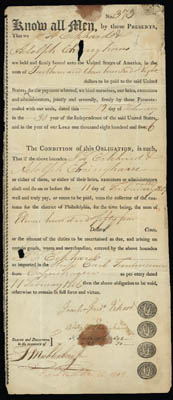 |
Muhlenberg, John Peter Gabriel (1746-1807), Virginia clergyman, General in Continental Army, after war Vice-President of Pennsylvania under Franklin, U.S. Congressman and Senator from Pennsylvania. Document Signed, one page, 5½ x 12½ Philadelphia, February 12, 1806. Partly-printed acknowledgment of import duties due on the cargo of the "Ship Carl Ferdinand from Copenhagen", boldly signed "P Muhlenberg" as Philadelphia Customs Collector. Verso is an address leaf to the U.S Treasury in Washington and bears a handstamped circle with manuscript "Free, Thomas Sergeant". Fine condition with two small internal holes.
Estimate 300 - 400
View details and enlarged photo
|
Lot 181 |
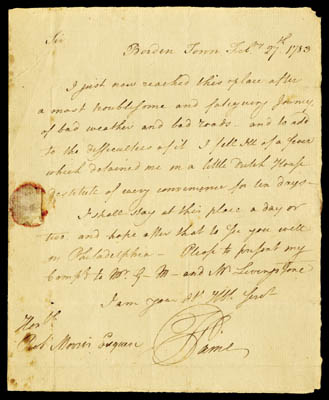 |
Paine, Thomas (1737-1809), American pamphleteer, revolutionary, radical, inventor, and intellectual. Autograph Letter Signed, "T Paine", one page, 6¾ x 8¼ Borden Town [New Jersey], February 27, 1783. To Robert Morris, Pennsylvania signer of the Declaration of Independence, in full:
"I just now reached this place after a most troublesome and fatiguing journey, of bad weather and bad roads - and to add to the difficulties of it, I fell ill of a fever which detained me in a little Dutch house destitute of every convenience for ten days.
"I shall stay at this place a day or two and hope after that to see you well in Philadelphia - Please to present my compliments to Mr. G.- M.- [George Mason?] and Mr. Livingstone."
With integral address leaf in Paine's hand and docketed on same leaf in Morris' hand "Borden Town, 29 Feby. 1783, Thos. Paine Esqr." below which someone has penned "This is the hand writing of the Honl Robt Morris signer of the Decln".
Some minor foxing, mainly along left blank margin, which still bears the original wax seal, tiny piece of upper right hand corner missing, otherwise Fine.
Estimate 25,000 - 30,000
A MAGNIFICENT AND RARE LETTER LINKING TWO PROMINENT AMERICAN PATRIOTS.
An 1851 note of provenance, also written on the address leaf, states "This letter was presented to me by Miss Sally Morris, granddaughter of Robert Morris, & I have consented to part with it to Mr. Davies only with the view of rendering more perfect his collection of autographs. I have added to it also an original letter from John Jay. Hillsdale N.Y. Nov 1, 1851. [signed] Robert W. Landis".
View details and enlarged photo
|
Lot 182 |
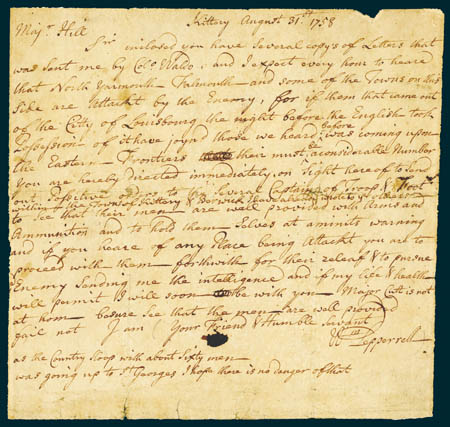 |
Pepperrell, Sir William, 1st Baronet (1696-1759), Merchant and soldier in Colonial Massachusetts; captured Fortress Louisbourg during King George's War which led to his nickname "the hero of Louisburg". Autograph Letter Signed, one page, 7½ x 12, Kittery [Maine], August 31, 1758. To Major John Hill, Esq., Norwich. Letter reads in full:
"Sir, Enclosed you have several copy's of Letters that was sent me by Col. Waldo, and I expect every hour to heare that North Yarmouth - Falmouth - and some of the Towns on this side are attackt by the Enemy, for if them that came out of the City of Louisbourg the night before the English took Possession of it have joynd those we heard before was coming upon the Eastern - Frontiers their must be a considerable number. You are hereby directed immediately on sight hereof to send out Positive orders to the several Captains of Troop & Foot within the Towns of Kittery and Berwick I have already wrote to you & others on to see that their men are well provided with Arms and Ammunition and to hold them selves at aminits [a minute's] warning and if you heare of any Place being attackt you are to proceed with them forthwith for their releaf & to pursue Enemy sending me the intelligence and if my life & health will permit I will soon be with you - Major Cuth is not at home. besure see that the men are well provided. Fail not as the Country Sloop with about sixty men was going up to St. Georges. I hope there is no danger of that. I am Your Friend & Humble Servant, Wm. Pepperrell"
With integral address leaf in Pepperell's hand, endorsed "on His Majesty's Esspeshel Service". Slightly trimmed along edges and inlaid to an overall 8½ x 13 and silked on verso, repairing small tears, with two missing pieces along blank lower right and left edges; subsequently folded horizontally and split along fold, not affecting any text.
Estimate 1,500 - 2,000
As a result of his success at Louisburg, Pepperrell was appointed to the rank of Lieutenant-General (the first American to reach that rank), but was unable to take up his command; he died at his home in Kittery Point in July of that same year.
King George's War refers to the operations in North America that were part of the War of the Austrian Succession (1740–48). The reference is only used in the United States. In Britain, Canada, and France, these operations are simply considered a theatre of the War of the Austrian Succession. It was the third of the four French and Indian Wars.
View details and enlarged photo
|
Lot 183 |
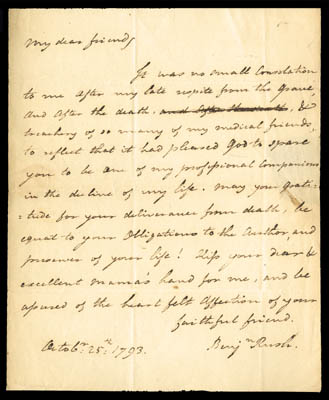 |
Rush, Benjamin (1746-1813), Pennsylvania signer of the Declaration of Independence, physician, politician, abolitionist, Treasurer of U.S. Mint. Autograph Letter Signed, "Benjn Rush", one page with integral address leaf, 7<1/2> x 9<1/4>, October 25, 1793. To Dr. James Mease, in full:
"It was no small consolation to me after my late respite from the grave, and after the death, & treachery of so many of my medical friends, to reflect that it had pleased God to spare you to be one of my professional companions in the decline of my life. May your gratitude for your deliverance from death, be equal to your obligations to the author, and preserves of your life! Kiss your dear & excellent Mama's hand for me, and be assured of the heart felt affection of your faithful friend."
Moderate wax seal damage on outer edge of verso, Fine.
Estimate 5,000 - 7,500
View details and enlarged photo
|
Lot 184 |
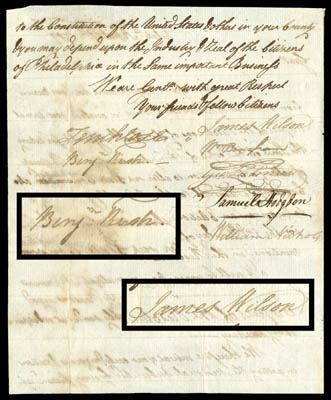 |
Rush, Benjamin (1746-1813) and Wilson, James (1742-1798), Both Pennsylvania signer of the Declaration of Independence, Wilson was co-author of the Constitution in 1790 and one of the six original justices of the Supreme Court appointed by George Washington Letter Signed, two pages, 7<1/4> x 8¾ with integral address leaf, Philadelphia, April 18, 1789. To the Honorable George Woods and other citizens of Bedford County, Pa.
"…enclosing several Copies [not present] of the Resolutions of the Honble. Assembly for taking the Sense of the People of Pennsylvania upon the Propriety of calling a Convention to alter our State Constitution…"
Fine condition.
Estimate 5,000 - 7,500
View details and enlarged photo
|
Lot 185 |
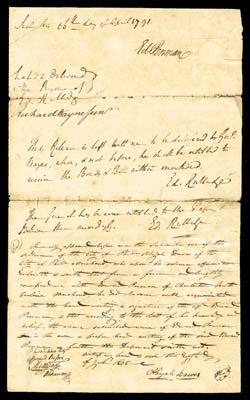 |
Rutledge, Edward (1749-1800), South Carolina signer of the Declaration of Independence, lawyer, politician, Governor of South Carolina. Autograph Document Signed, 1½ pages (two leaves), 8 x 12¾ Charleston, S.C., April 16, 1791. Discharge of debt owed to the estate of one James Penman and his heirs by Revolutionary War hero General "Mad" Anthony Wayne. The first page, in the hand of James' son Edward Penman, is a list of "Papers deposited by Edwd. Penman with Edwd. Rutledge Esq." itemizing debts owed Penman by Wayne including a Bill of Exchange dated 28 Sept. 1785 in the amount of £1,000 drawn by Willem & Jan Willink of Amsterdam [Dutch merchants to whom Wayne had mortgaged his Pennsylvania property to gain funds for his Georgia enterprise] and payable to Penman; also "a Bill of Sale of 33 Negroes from Genl. Wayne to E. Penman", a "Lease and release from Genl. Wayne to E. Penman of Richmond & Kew" [the names of Wayne's two rice plantations] and a "Warrant of Atty. by E. Penman to Wm. Lewis Esqr. [Wayne's attorney] of Phila. to enter satisfaction" [on the Pennsylvania judgment]. This list is signed by Rutledge in the lower right corner. The full second page is entirely in the hand of Rutledge and is Penman's release of Wayne's debts, having "received full satisfaction". The release is signed at the top of the third page by Penman and as witnesses by Rutledge and by Richard Wayne, Junr., a cousin who was apparently representing the General. Below this are two other shorter ADsS by Rutledge: "This release is left with me to be delivered to Genl. Wayne, when, and not before, he shall be entitled…Ed. Rutledge", and ""The General has become entitled to the Papers & Deliver them accordingly, E. Rutledge". Next appears a notarizing of Penman's signature in 1805, presumably at the insistence of Wayne's heirs. On the fourth page is a brief docket by Rutledge.
Some archival tape repairs of horizontal splits (the second leaf has been separated and rejoined along the center fold), one affecting the topmost Rutledge signature, otherwise a Fine and important Eighteenth Century document.
Estimate 3,000 - 4,000
AN IMPORTANT DOCUMENT TYING TOGETHER A SIGNER OF THE DECLARATION OF INDEPENDENCE AND A KEY REVOLUTIONARY WAR FIGURE WITH FOUR SIGNATURES AND ABOUT 250 WORDS IN RUTLEDGE'S HAND.
Although nothing written by Wayne appears here, this document reflects an important chapter in his life. It marks the failure of his civilian career as a rice planter on two plantations granted him by the State of Georgia in 1782. To farm his land Wayne purchased slaves from Penman, a Charleston slave broker, incurring a debt that, after a series of misfortunes, would cost him his Georgia property. The satisfaction of the debt, several years later, is documented here, with Penman taking both plantations and the remaining slaves as the best he could get from Wayne, who agreed to value the plantations at a lower figure than he wished in order to save his Pennsylvania home, against which Penman had filed a lien.
View details and enlarged photo
|
Lot 186 |
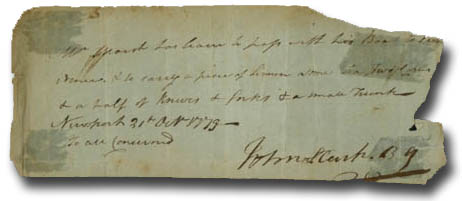 |
Stark, John (1728-1822), American General during the Revolutionary War; widely known as the "Hero of Bennington" for his exemplary service at the Battle of Bennington in 1777. War-time Autograph Document Signed as Brigadier General, "John Stark, B G", one page, 7½ x 3, Newport (R.I.), October 31, 1779. A safe Conduct Pass issued to a "Mr. Marsh", in full:
"Mr. Marsh has leave to pass with his Boat to Providence, & to carry a piece of Linnen [sic] & some tea, two cases & a half of knives & forks & a small trunk. Newport 21st Oct 1779 - To all Concerned, John Stark, B G"
Boldly signed, though ragged, especially at the right edge, with tape stains showing through at the corners; Good. Elegantly matted and framed to an overall 12½ x 8½.
Estimate 1,000 - 1,500
View details and enlarged photo
|
Lot 187 |
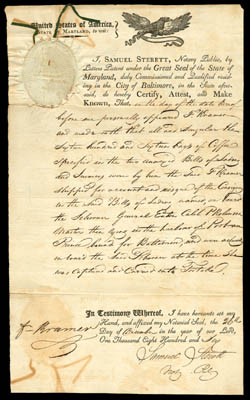 |
Sterett, Samuel (1758-1833), Maryland Delegate to the 2nd U.S. Congress (1791-1793) during which time he also served as secretary to the Maryland Society for the Abolition of Slavery (1791) and as personal secretary to President of the Congress, Elias Houdini (1792-1793). Document Signed, one page, 7½ x 12½ Baltimore, December 26, 1806. Handsome, partly-printed sworn statement of one F. Kramer that 1,616 bags of coffee, as per two bills of lading, were aboard "the Schooner General Eaton, Caleb P Robinson Master then lying in the harbour of Port au Prince bound for Baltimore, and were actually on board the said Schooner at the time she was captured and carried into Tortola", signed by Sterett as Notary Public. The illustrated document features an eagle design and Sterett's intact paper notary seal featuring a three-masted ship.
Estimate 400 - 600
View details and enlarged photo
|
Lot 188 |
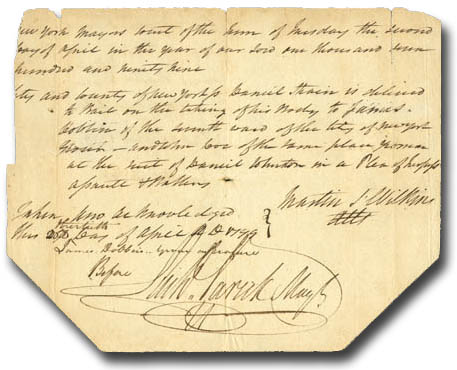 |
Varick, Richard (1753-1831), Revolutionary War officer; first aide-de-camp to Benedict Arnold, exonerated after questioning regarding Arnold's treason; wartime recording secretary to George Washington; mayor of New York (1790-1801). Document Signed as Mayor of New York, one page, 7¾ x 6¾ New York, April 30, 1799 relating to a trespassing case brought before the New York Mayor's Court. Large, strongly penned signature "Richard Varick May 1". Left edge irregularly trimmed affecting the first letters of four words in as many lines. Blank bottom corners diagonally trimmed; two small fold separations with negligible paper loss and light paper toning; overall Fine.
Estimate 200 - 300
View details and enlarged photo
|
Lot 189 |
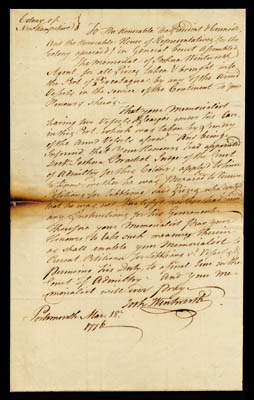 |
Wentworth, Joshua (1742-1809), Merchant, landowner, politician and prominent New Hampshire citizen; Revolutionary War soldier. Autograph Letter Signed one page with integral address leaf in Wentworth's hand, 7¼ x 12, Portsmouth, New Hampshire, March 18, 1776. To Mesheack Weare, governor of New Hampshire at Exeter, in part:
"…The memorial of Joshua Wentworth Agent, for all Prizes taken & brought into the Port of Piscataqua, by any of the armed Vessels in the service of the Continent…That your Memorialist having two Vessels & Cargos under his care, in this Port, which was taken by Sundry of the arm'd Vessels aforesd. And being Informed that Your Honours had appointed Doctr. Joshua Bracket, Judge of the Court of Admiltry for this Colony, apply'd to him to know, wether he was prepared to receive Petitions for Libbling said Prizes, who reply'd that he was not qualify'd, neither had receiv'd, any Instructions for his Government. Therefore your memorialist pray your Honours to take such measures therein as shall enable your memorialist to Present Petitions for Libbleing [said] Vessels & Pursuing his Duty, to a final Line in the Court of Admiltry…Josh. Wentworth"
With integral address leaf, inlaid to a paper frame, 8¼ x 12¾ which has subsequently been folded horizontally and split and again repaired along said fold, not affecting legibility, otherwise Fine.
Estimate 1,000 - 1,500
Letter refers to the practise of privateering, by which private ships' Captains were given permission by a government (in this case, the state of New Hampshire) to raid and capture merchant ships of a given nation during time of war. The ships and their cargoes were sold with the proceeds being split between the Captains and the government. While the Colonial forces had no organized navy during the Revolutionary War, over 2,000 merchant vessels were involved in this practice against the British. Portsmouth was one of the principal centers of American privateering.
View details and enlarged photo
|
|